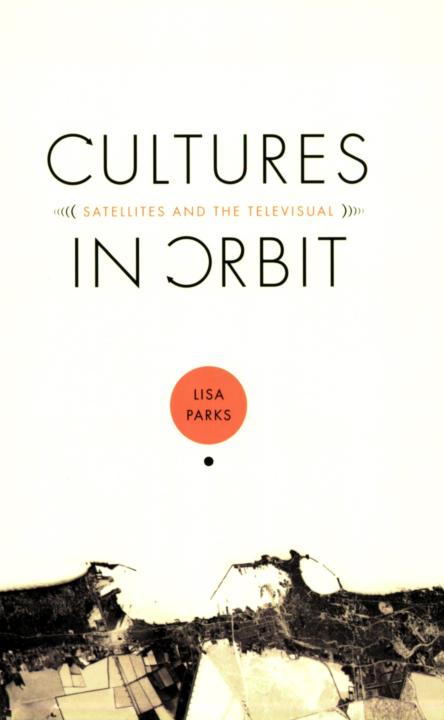Lisa Parks: Cultures in Orbit: Satellites and the Televisual (2005)
Filed under book | Tags: · archaeology, art, body, journalism, mass media, satellite, space, technology, television, vision

“In 1957 Sputnik, the world’s first man-made satellite, dazzled people as it zipped around the planet. By the beginning of the twenty-first century, more than eight thousand satellites orbited the Earth, and satellite practices such as live transmission, direct broadcasting, remote sensing, and astronomical observation had altered how we imagined ourselves in relation to others and our planet within the cosmos. In Cultures in Orbit, Lisa Parks analyzes these satellite practices and shows how they have affected meanings of “the global” and “the televisual.” Parks suggests that the convergence of broadcast, satellite, and computer technologies necessitates an expanded definition of “television,” one that encompasses practices of military monitoring and scientific observation as well as commercial entertainment and public broadcasting.
Roaming across the disciplines of media studies, geography, and science and technology studies, Parks examines uses of satellites by broadcasters, military officials, archaeologists, and astronomers. She looks at Our World, a live intercontinental television program that reached five hundred million viewers in 1967, and Imparja tv, an Aboriginal satellite TV network in Australia. Turning to satellites’ remote-sensing capabilities, she explores the U.S. military’s production of satellite images of the war in Bosnia as well as archaeologists’ use of satellites in the excavation of Cleopatra’s palace in Alexandria, Egypt. Parks’s reflections on how Western fantasies of control are implicated in the Hubble telescope’s views of outer space point to a broader concern: that while satellite uses promise a “global village,” they also cut and divide the planet in ways that extend the hegemony of the post-industrial West. In focusing on such contradictions, Parks highlights how satellites cross paths with cultural politics and social struggles.”
Publisher Duke University Press, 2005
ISBN 0822334615, 9780822334613
256 pages
Review (John Cloud, Technology and Culture, 2006)
Review (Howard Fremeth, Topia, 2006)
Review (Gerald Sim, Screening the Past, 2006)
Review (Fredessa D. Hamilton, The Communication Review, 2007)
Notes from Lisa Parks’ 2008 talk on satellite art (Regine Debatty, We Make Money Not Art)
Benedetta Brevini, Arne Hintz, Patrick McCurdy (eds.): Beyond WikiLeaks: Implications for the Future of Communications, Journalism and Society (2013)
Filed under book | Tags: · internet, internet activism, journalism, mass media, media activism, wikileaks

“Revelations published by the whistleblower platform WikiLeaks, including the releases of U.S. diplomatic cables in what became referred to as ‘Cablegate’, put WikiLeaks into the international spotlight and sparked intense about the role and impact of leaks in a digital era. Beyond WikiLeaks opens a space to reflect on the broader implications across political and media fields, and on the transformations that result from new forms of leak journalism and transparency activism. A select group of renowned scholars, international experts, and WikiLeaks ‘insiders’ discuss the consequences of the WikiLeaks saga for traditional media, international journalism, freedom of expression, policymaking, civil society, social change, and international politics. From short insider reports to elaborate and theoretically informed academic texts, the different chapters provide critical assessments of the current historical juncture of our mediatized society and offer outlooks of the future. Authors include, amongst others, Harvard University’s Yochai Benkler, Graham Murdoch of Loughborough University, net activism scholar, Gabriella Coleman, the Director for International Freedom of Expression at the Electronic Frontier Foundation, Jillian York, and Guardian editor, Chris Elliott. The book also includes a conversation between philosopher, Slavoj Zizek, and WikiLeaks founder, Julian Assange, and its prologue is written by Birgitta Jónsdóttir, Icelandic MP and editor of the WikiLeaks video, Collateral Murder.”
Publisher Palgrave Macmillan, 2013
ISBN 1137275758, 9781137275752
308 pages
John McMillian: Smoking Typewriters: The Sixties Underground Press and the Rise of Alternative Media in America (2011)
Filed under book | Tags: · 1960s, alternative media, counterculture, journalism, mass media, new left, publishing

How did the New Left uprising of the 1960s happen? What caused millions of young people-many of them affluent and college educated-to suddenly decide that American society needed to be completely overhauled?
In Smoking Typewriters, historian John McMillian shows that one answer to these questions can be found in the emergence of a dynamic underground press in the 1960s. Following the lead of papers like the Los Angeles Free Press, the East Village Other, and the Berkeley Barb, young people across the country launched hundreds of mimeographed pamphlets and flyers, small press magazines, and underground newspapers. New, cheaper printing technologies democratized the publishing process and by the decade’s end the combined circulation of underground papers stretched into the millions. Though not technically illegal, these papers were often genuinely subversive, and many of those who produced and sold them-on street-corners, at poetry readings, gallery openings, and coffeehouses-became targets of harassment from local and federal authorities. With writers who actively participated in the events they described, underground newspapers captured the zeitgeist of the ’60s, speaking directly to their readers, and reflecting and magnifying the spirit of cultural and political protest. McMillian pays special attention to the ways underground newspapers fostered a sense of community and played a vital role in shaping the New Left’s highly democratic “movement culture.”
Deeply researched and eloquently written, Smoking Typewriters captures all the youthful idealism and vibrant tumult of the 1960s as it delivers a brilliant reappraisal of the origins and development of the New Left rebellion.
Publisher Oxford University Press, 2011
ISBN 0195319923, 9780195319927
304 pages
review (Dan Berger, International Journal of Communication)
review (Kirkus Reviews)
review (Russ Smith, The Wall Street Journal)
interview with the author (video, 48 min)

